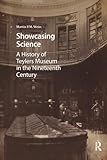Showcasing Science : A History of Teylers Museum in the Nineteenth Century / Martin Weiss.
Material type: TextSeries: History of Science and Scholarship in the NetherlandsPublisher: Amsterdam : Amsterdam University Press, [2019]Copyright date: ©2019Description: 1 online resource (384 p.) : 10 halftonesContent type:
TextSeries: History of Science and Scholarship in the NetherlandsPublisher: Amsterdam : Amsterdam University Press, [2019]Copyright date: ©2019Description: 1 online resource (384 p.) : 10 halftonesContent type: - 9789462982246
- 9789048532148
- online - DeGruyter
- Issued also in print.
| Item type | Current library | Call number | URL | Status | Notes | Barcode | |
|---|---|---|---|---|---|---|---|
 eBook
eBook
|
Biblioteca "Angelicum" Pont. Univ. S.Tommaso d'Aquino Nuvola online | online - DeGruyter (Browse shelf(Opens below)) | Online access | Not for loan (Accesso limitato) | Accesso per gli utenti autorizzati / Access for authorized users | (dgr)9789048532148 |
Frontmatter -- Table of Contents -- 1. Introduction -- 2. The Birth of a Musaeum -- 3. Van Marum - Empiricism and Empire -- 4. Van der Willigen - Precision and the Discipline of Physics -- 5. Lorentz - Function Follows Form and Theory Leads to Experiment -- 6. Conclusion -- Appendix -- Acknowledgements -- Archives -- Bibliography -- Index
restricted access online access with authorization star
http://purl.org/coar/access_right/c_16ec
Teylers Museum, the first and oldest museum of the Netherlands, was founded in 1784 and very soon became one of the most important centres of Dutch science. The Museum's first director, Martinus van Marum, famously had the world's largest electrostatic generator built and set up in Haarlem. This subsequently became the most prominent item in the Museum's world-class, publicly accessible, and constantly growing collections. These comprised scientific instruments, mineralogical and palaeontological specimens, prints, drawings, paintings, and coins. Van Marum's successors continued to uphold the institution's prestige and use the collections for research purposes, while it was increasingly perceived as an art museum by the public. In the early 20th century, the Nobel Prize Laureate Hendrik Antoon Lorentz was appointed head of the scientific instrument collection and conducted experiments on the Museum's premises. This book charts the history of Teylers Museum from its inception until Lorentz' tenure. From the vantage point of the Museum's scientific instrument collection, it gives an analysis of the changing public role of Teylers Museum over the course of the 19th century.
Issued also in print.
Mode of access: Internet via World Wide Web.
In English.
Description based on online resource; title from PDF title page (publisher's Web site, viewed 02. Mrz 2022)


